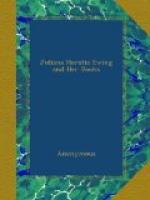Perhaps some of us may wonder that Julie should need lessons of encouragement and comfort who was so apt a teacher herself; but however ready she may always have been to hope for others, she was thoroughly humble-minded about herself. On one day near the end, when she had received some letter of warm praise about her writings, a friend said in joke, “I wonder your head is not turned by such things”; and Julie replied: “I don’t think praise really hurts me, because, when I read my own writings over again they often seem to me such ‘bosh’; and then, too, you know I lead such a useless life, and there is so little I can do, it is a great pleasure to know I may have done some good.”
It pleased her to get a letter from Sir Evelyn Wood, written from the Soudan, telling how he had cried over Laetus; and she was almost more gratified to get an anonymous expression from “One of the Oldest Natives of the Town of Aldershot” of his “warm and grateful sense of the charm of her delightful references to a district much loved of its children, and the emotion he felt in recognizing his birthplace so tenderly alluded to.” Julie certainly set no value on her own actual MSS., for she almost invariably used them up when they were returned from the printers, by writing on the empty sides, and destroying them after they had thus done double duty. She was quite amused by a relation who begged for the sheets of “Jackanapes,” and so rescued them from the flames!
On the 11th of May an increase of suffering made it necessary that my sister should undergo another operation, as the one chance of prolonging her life. This ordeal she faced with undaunted courage, thanking God that she was able to take chloroform easily, and only praying He would end her sufferings speedily, as He thought best, since she feared her physical ability to bear them patiently was nearly worn out.
Her prayer was answered, when two days later, free from pain, she entered into rest. On the 16th of May she was buried in her parish churchyard of Trull, near Taunton, in a grave literally lined with moss and flowers;—so many floral wreaths and crosses were sent from all parts of England, that when the grave was filled up they entirely covered it, not a speck of soil could be seen; her first sleep in mother earth was beneath a coverlet of fragrant white blossoms. No resting-place than this could be more fitting for her. The church is deeply interesting from its antiquity, and its fine oak-screen and seats, said to be carved by monks of Glastonbury, whilst the churchyard is an idyllically peaceful one, containing several yew-trees; under one of these, which over-shadows Julie’s grave, the remains of the parish stocks are to be seen—a quaint mixture of objects, that recalls some of her own close blendings of humour and pathos into one scene. Here, “for a space, the tired body lies with feet towards the dawn,” but I must hope and believe that the active soul, now it is delivered from the




